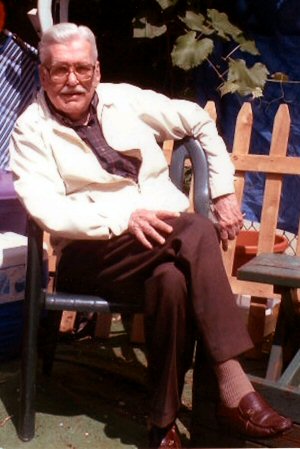EP&M Online Essay
WILLIAM F. CARLSON
1921-2007
by
Joseph S. Salemi

William F. Carlson
Photograph by Gabriel Benitez, grandson
On January 29, 2007, William F. Carlson died
after a protracted battle with cancer. He was the Editor of Iambs & Trochees, and my close
friend. He leaves his wife Irene, his daughter Anne Marie, and
two grandsons, Gabriel and George.
I first met Bill Carlson over twelve years
ago, when he ran a small poetry reading series in lower
Manhattan. He had already been associated with the journal Hellas, and had published a number
of his own poems in little magazines around the country. Bill was
also a novelist, whose autobiographical No Souvenirs To Remind Me is a
gripping account of his experiences as an ambulance driver and
paramedic during the Second World War.
Bill came to poetry late in life, after taking
one of Alfred Dorn’s introductory courses on formal poetry in the
1980s. Those justly celebrated seminars brought a great many
persons to poetry who might otherwise have never considered the art’s
riches. After Bill Carlson had attended one of them, he was
hooked forever on poetry.
It was not always an easy match. Carlson
was a tough New York kid who had spent part of his childhood in an
orphanage, and who had worked long years at a dull civil-service
job. He also had seen some of the most savage fighting of the war
in Belgium and Germany during ’44 and ’45. As a member of the
ambulance corps he was unarmed, and took no part in actual
combat. But those were the days before helicopter medevac, and
Bill was right there in the midst of it, taking the same risks as any
infantryman. In his case, however, he was on a mission of mercy
to the wounded. And that mission was universal—as he said to me
once, “If a soldier was wounded I picked him up, regardless of his
uniform. What was I gonna do… leave some kid screaming because of
the color of his tunic? The blood all looked red to me.”
These chastening experiences left Bill
somewhat rough around the edges, so to speak. He was a
hard-drinking, hard-smoking, and hard-talking man. He was also a
serious professional gambler who had the steely toughness that success
in such a profession requires. His temper, when aroused, could be
volcanic. I’ll never forget his rage at my slowness and
mathematical incompetence when he tried in vain to teach me how to win
at craps and blackjack. “You can’t count, Salemi!” he screamed at
me. All I could do was mumble an apology for my ineptitude at
figuring odds.
And yet this hard-bitten man had a very gentle
and affectionate side to his nature. He was especially kind to
young poets, who he felt needed special attention and nurturing if they
were to blossom. And he loved good formal poetry with a genuine
tenderness. He was always enthusiastic about such poems, and
loved to discuss their structure, their meaning, and their aesthetic
effect. A battered and dog-eared copy of Babette Deutsch’s book
on metrical form was his constant companion, and he would read chapter
and verse from it with the same kind of apodictic certainty that one
finds in fundamentalists who quote Scriptural text. When it came
to formal poetry, Bill Carlson had the zeal of a new convert.
He founded Iambs
& Trochees because he was “fed up,” as he would growl, with
the “sameness” and “emptiness” of mainstream free verse. Bill
knew that writers could produce something better than the narcissistic
drivel and feelgood emotionalizing that have hijacked the name of
poetry today. And with the tough-minded audacity typical of him
and his generation, he decided to start a magazine “for the good
stuff,” as he put it. Bill did this despite the fact that he was
in his late seventies, and had only rudimentary computer skills in the
beginning. Obstacles never fazed him. He also knew that
there wasn’t the slightest chance of recouping the financial loss that
a print magazine entails today. “I don’t care,” he said, with an
impatient wave of his hand. “I’m gonna do it.” And do it he
did. Within three years, Iambs
& Trochees became one of the premier formalist poetry
journals in America.
I last saw him on Saturday, two days before he
died. The cancer had ravaged him terribly, and I barely
recognized the vigorous, argumentative man whom I had worked and fought
with for nearly five years. He had wasted to a wraith-like
figure. But his eyes still shone with fire, and I knew that the
inner core of Bill Carlson was still there, like hot sparks in an
ember. He could no longer speak for exhaustion and
weakness. All he could do was transfix me with an unearthly gaze,
as if he had seen beyond the limits of mortality.
He will be missed—not just by friends and
family, but by the world of poetry.
Joseph S. Salemi
NOTE: A selection of William F. Carlson’s published poetry
can be read in the e-book section of The
New Formalist web magazine, at www.formalpoetry.com. His
e-book is titled “Memorial Day—The 30th of May.” Carlson
also published a collection of his poetry with Somers Rocks Press, No Sun, No Shadow, which can be
purchased at http://www.expansivepoetryonline.com.
Joseph S. Salemi
